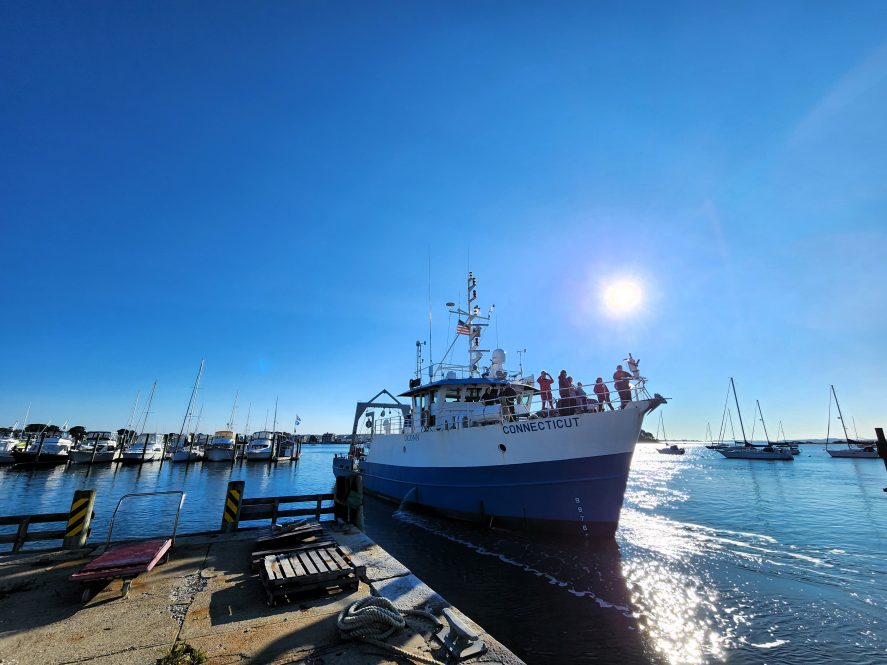Faculty and graduate student researchers have embarked from Avery Point for an up-close investigation of offshore wind power and its effect on the marine environment

The R/V Connecticut embarked from Avery Point to study offshore windfarms and their impact on the marine ecosystem. Photo by Loretta Waldman
On Wednesday, Sept. 4, researchers from UConn's Avery Point campus embarked on the first of three cruises planned as part of a collaborative, multi-year project funded by a $1.25 million grant from Orsted and Eversource, the developers of the groundbreaking Revolution Wind clean energy project.
The voyage marks the first phase of a scientific research program announced in November 2023 to study the relationship between offshore wind farms and marine life. The two-day trip aboard UConn's 90-foot research vessel R/V Connecticut will focus on capturing the state of the ocean in the project area during construction of the wind farm's 65 turbines.
Revolution Wind – Connecticut's first offshore wind farm venture - is located 32 miles southeast of Connecticut, 15 miles south of Rhode Island, and 12 miles southwest of Martha's Vineyard.
"This is a great opportunity to start off the scientific aspect of this project," says Assistant Research Professor of Marine Sciences and Project Manager Paola Batta-Lona. "We are working together and coordinating with industry to monitor marine life and currents in the leased area during and after installation of turbines."
The Connecticut Initiative on Environmental Research of Offshore Wind (CIEROW) is overseeing the project. The umbrella initiative was created to leverage the expertise of faculty at UConn's Marine Sciences, Maritime Studies, and other departments to conduct targeted research on the impact and associated opportunities of the offshore wind-energy industry.
Batta-Lona's research focuses on zooplankton molecular ecology and she will collect samples of environmental DNA during the cruise. Environmental DNA (eDNA) is an emerging, non-invasive approach to studying genetic material shed by animals and plants into the water and, "to determine what prey and predators are there, and detect changes over time."
Professor Evan Ward, head of the Marine Sciences Department, and Dr. Annemarie Seifert, Dean & Chief Administrative Officer of the campus, are the lead Principal Investigators (PI) on the project. Other UConn marine scientists participating in the cruise include Bridget Holohan, who will conduct imaging work to characterize zooplankton; Mike Whitney, a professor specializing in physical oceanography who will study water properties and flow pathways; Professor Hannes Baumann, an expert in how fish populations may adapt to human-caused changes in their coastal habitats; and Professor Heidi Dierssen, whose team will monitor phytoplankton communities using satellite data and on-site measurements.
Back on shore, the team will compare their findings to baseline data generated by the Gloucester Marine Genomics Institute and other sources to create a picture of the marine environment before and after the construction, says Batta-Lona.
Though marine science is a critical component of the study, it is not the only one. Nathaniel Trumbull, a professor from the Department of Geography, is probing topics such as the social and economic impact of the project and workforce development. The grant also supports related educational programs, such as community lectures, and opportunities for students. Three marine sciences graduate students are participating in the first cruise and collecting samples.
The announcement of the grant in November 2023 capped years of work on the Revolution Wind project that began in 2017 and involved an extensive environmental review and stakeholder engagement process, including under the National Environmental Policy Act and the National Historic Preservation Act, prior to approval by the Bureau of Ocean Energy Management.
UConn has a long history of involvement with clean energy and, in recent years, has made it a strategic focus. Faculty, students, staff, and alumni are engaged in a broad range of clean energy research and initiatives, much of it through specialized centers and institutes like CIEROW. Others include the Center for Clean Energy Engineering (C2E2), Eversource Energy Center, Future Climate Venture Studio, and Innovation Partnership Building.
Revolution Wind is under construction offshore and will have the capacity to generate 704 megawatts of clean offshore wind energy, enough to power more than 350,000 homes in Connecticut and Rhode Island. The second and third research cruises are scheduled October 18-19, 2024, and March 24-25, 2025 respectively.






